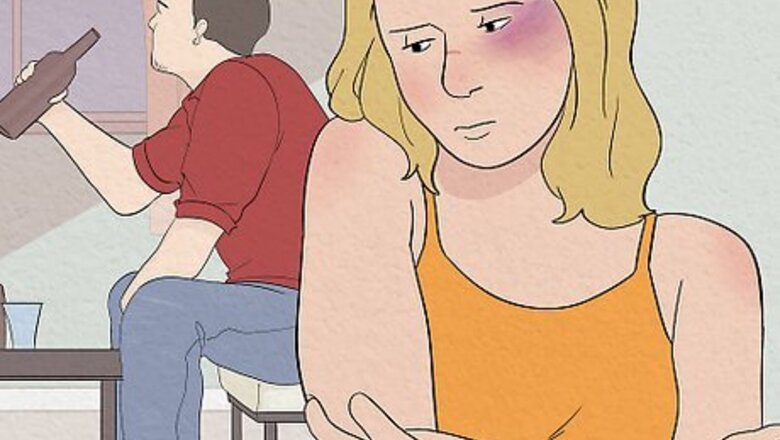
views
- It could be time to give up on the relationship if the other person refuses to seek any type of treatment for their mental health condition.
- It might be time to end the relationship if you’re only sticking around out of pity.
- Leave any type of relationship where you’re experiencing physical or emotional abuse, whether it’s from a partner or a loved one.
Signs It’s Time to Leave
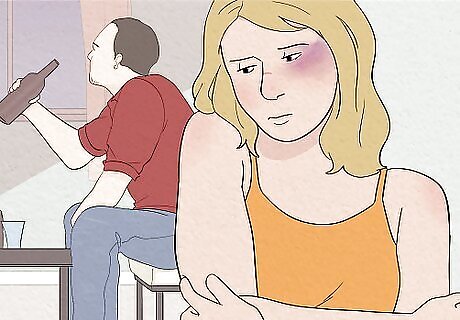
Your relationship is physically abusive. In any type of relationship, your physical health and wellbeing always come first. You have every right to cut ties and leave the relationship if the person ever threatens you, hurts you, or does anything that makes you feel unsafe. It doesn’t matter how minor the instances of abuse seem—abuse is abuse, no matter how severe or frequent it is. Here are a few examples of what physical abuse can look like: Your partner physically hurts you, but then lets up on the attack once you acquiesce to their requests. A parent threatens to hurt you and has hurt you a couple of times in the past. A sibling willfully damages or breaks your belongings. Warning: Unfortunately, acts of physical abuse in an intimate relationship are rarely isolated. If the person has hurt you once, there’s a good chance that they’ll do it again.

Your relationship is emotionally or mentally abusive. Maybe the person in your life doesn’t let you have any personal space, or they feel incredibly jealous when you spend time with people other than them. Their love often seems conditional and unpredictable, and you often feel like their emotional punching bag. Other common signs of emotional abuse include: A refusal to take responsibility. If anything, they’ll find a way to pin the blame on you. Guilt-tripping and manipulation. They use extreme tactics to get their way, like threatening to hurt themselves or take their own life. Threats of physical abuse. They imply that you could get hurt in the future if you don’t comply.
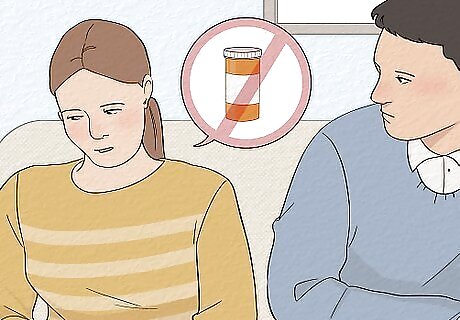
They won’t get any sort of mental health treatment. Maybe your partner or loved one doesn’t think mental health treatment like therapy will work, or they just aren’t interested in taking steps to improve their mental health. While they’re entitled to their beliefs on therapy and other treatment options, you don’t (and shouldn’t) have to stick around waiting for them to take care of themselves. While it’s really noble and compassionate to stick by this person’s side, it also isn’t worth sacrificing your own mental health. Your life and livelihood are just as important as theirs—you shouldn’t feel like you’re giving up your own happiness to spend time around them.
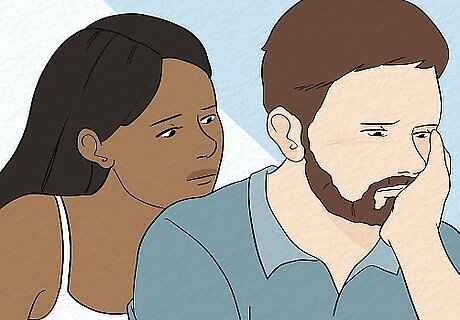
You only stick around because you feel pity for them. All healthy relationships are rooted in mutual trust, respect, and honesty. Even if your intentions are good, staying with someone out of pity is disrespectful to both you and the other person. Take a moment to ask yourself what you get out of your relationship with this person. Does it feel fulfilling, or do you feel a sense of obligation to stick around? If it’s the latter, it might be time to leave. When you stay with someone out of pity, you’re only diminishing their sense of self-worth. Giving them the space to live and exist without you in the picture is far more considerate.
How to End Things
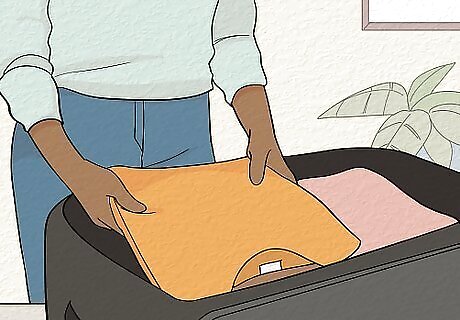
Create a safety plan for yourself if you need one. If you're breaking things off with an abusive partner, take a moment to think about the aspects of your life you’ll need to adjust. Will you need to move into a new home, or travel to a new area? Creating a safety plan can help you iron out the logistics of your breakup so you can safely deal with the aftermath. It can help to: Find a safe place to go in your home if your partner gets violent Create a code word to signify when you’re in trouble Pack ahead of time and prepare to leave quickly
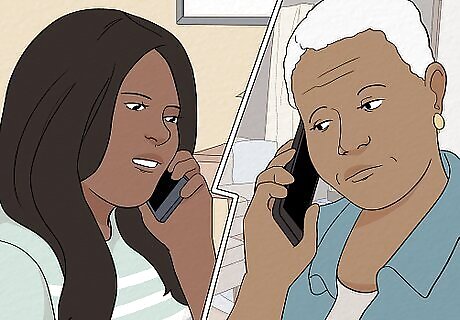
Touch base with the members of your support system. Tell your close friends and loved ones about the current status of your relationship and how you’ve decided to end things. Let them know when you’re planning to cut ties, as well as how you’re going to break the news to your partner or loved one. Ending a relationship can be especially challenging if you’re leaving an abusive partner. Keeping your support system in the loop about your break-up plans is a great way to stay safe, so they can keep tabs on you and your wellbeing.
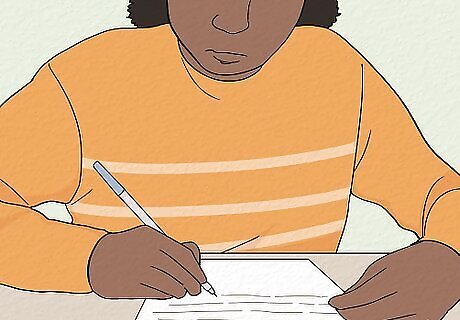
Plan what to say ahead of time. Write down your thoughts to help get them out in the open. It can also be really helpful to practice what you’d like to say out loud, so you feel a little more comfortable and prepared when the time comes. You can also practice with a friend and see what they think about your break-up speech.

Ask to meet with them in person. As awkward and painful as it may be at the time, meeting in person is the most considerate and respectful way to make a clean break. Sending a message over text or social media isn’t a very respectful way to end things, so it’s always best to meet in person. Warning: Only meet with the individual in person if you feel safe doing so. If you’re worried about the person reacting violently, it’s perfectly fine to end your relationship digitally.
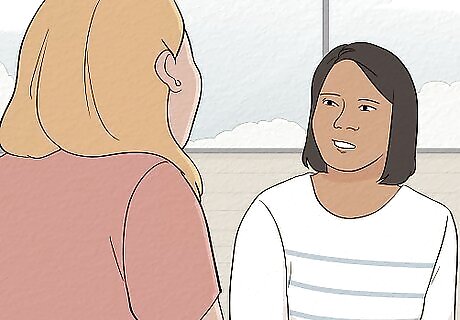
Break off your relationship clearly and respectfully. Tactfully tell the person that you’re looking to break up with them. Explain what the future boundaries of the relationship need to look like; if you don’t want to see them anymore, make that as clear as possible. “I don’t feel happy or fulfilled in this relationship, and it’s starting to take a toll on my mental health. I think we need to take an indefinite break, and I would like some space in the meantime.” “Our relationship doesn’t feel healthy, and I think we should break up. I’m open to being friends in the future, but I need a lot of space to think and reflect before that point.” “Mom, I don’t think our relationship is healthy—in fact, I don’t think it’s ever been healthy. I think we need some space from each other.”
What if I still want to save the relationship?
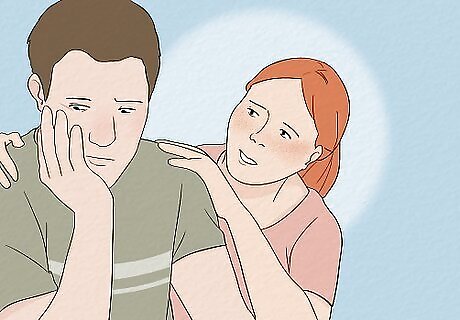
Encourage them to get mental health treatment. Plan your conversation for a time in the day when you’ll have plenty of time to chat—at least a 30-minute window is good for this type of dialogue. Gently explain some of their symptoms and behaviors that you’ve noticed. Give them the space to explain how they’re feeling, and practice active listening to show that you’re engaged in what they’re saying. Remind them that you’re there to support them, and offer them an encouraging nudge to get mental health treatment. “I know you’ve been struggling a lot lately, and I’d really like to support you and help you feel better. Would you be interested in giving therapy a try?” “You don’t have to suffer through these feelings alone—a therapist and psychiatrist can be a big help. I can help you find one that’s covered by your insurance, if that would help.”
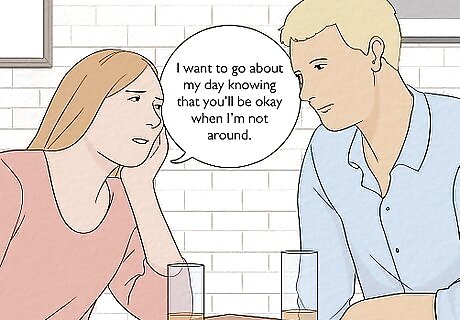
Let them know how their mental illness impacts your daily life. A little honesty can go a long way with your friend or loved one, especially if they don’t realize how much their behavior is affecting the people around them. Stick with “I” statements as you share your feelings—these are sentences that start with I rather than you, which helps the other person feel less defensive. “When you make comments about hurting yourself, I get really scared that I’m going to lose you. I want to go about my day knowing that you’ll be okay when I’m not around.” “I feel sad and frustrated when I have to do all of the household chores, since it makes me feel like my time isn’t as valuable as yours. It would mean a lot to me if you met with a mental health professional so you can start being a more active member of this household.”
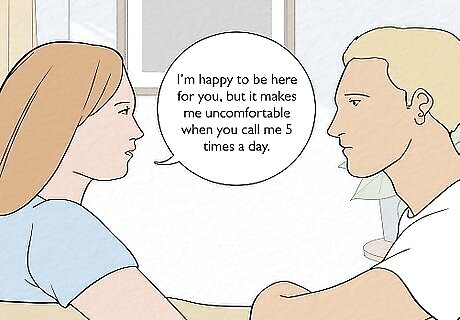
Set clear boundaries with them. It’s important to care for your own mental health and well-being, rather than always prioritizing someone else’s. Establish boundaries by letting your partner or loved one know what you can and can’t do for them, especially if they won’t get treatment for their mental illness. “I need at least an hour of time to myself each night where I can chill and unwind from the day.” “I’m happy to be here for you, but it makes me uncomfortable when you call me 5 times a day. Please call me once a day at a time that’s convenient for both of us.” “I need you to emotionally check in with me before you start venting. I don’t always have the mental energy to really process and engage with what you’re saying.”
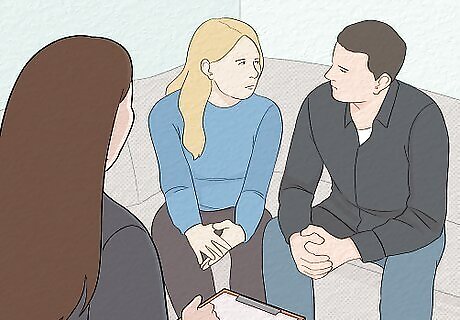
Visit a couples’ counselor together. If your partner refuses to take any steps toward mental health treatment, see if they’d be willing to attend couples’ therapy with you. Discuss how you’re currently feeling about the relationship, and mention how you feel therapy could help your bond. “I don’t feel like we’re currently on the same page in our relationship. I think that seeing a couples’ counselor would give us both a chance to feel seen and heard.” “I don’t feel very good about where our relationship is at now, and I think we need to take bigger steps if we want to make things work. Would you be willing to see a couples’ counselor with me?”
Key Takeaways
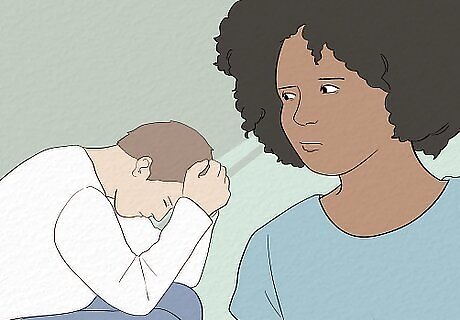
You don’t have to feel guilty for leaving an unhealthy relationship. It’s easy to feel guilty after leaving any sort of toxic relationship; in fact, many people do! It’s important to remember, though, that this sense of internal blame and guilt is nothing more than a defensive tactic to hide the painful scars of the relationship. It’s perfectly normal to feel sad, but make sure that you’re finding ways to promote and foster positive feelings of self-love rather than self-blame, like: Leaning on your support system of friends and loved ones Practicing regular self-care with activities like exercise and your favorite hobbies Meeting new friends and connections Discussing your experiences with a counselor
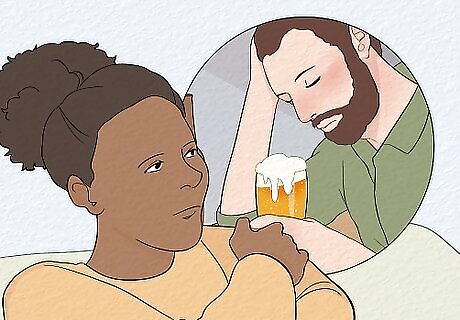
You are not responsible for another person’s mental illness. When you’re really close with someone, it can be so tempting to “fix” their mental illness—but this is not only impossible, it’s also not your responsibility. If your partner or loved one doesn’t “believe” in treatment, it’s not your job to convince them otherwise. Your life is just as important and valuable as theirs, and you deserve to spend it in a way that is fulfilling to you. The same logic applies if you feel like you make your loved one or partner “happy” by sticking around. While it’s great that you make them feel good, that feeling should go both ways. If it just leaves you both stuck in a codependent loop, you’re definitely better off splitting up.

You are entitled to a healthy relationship where your needs are met. Healthy relationships are rooted in good communication, honesty, trust, and overall equality. If your relationship is constantly missing the mark in these categories, you’re well within your rights to step away and prioritize relationships that are more gratifying to you.



















Comments
0 comment